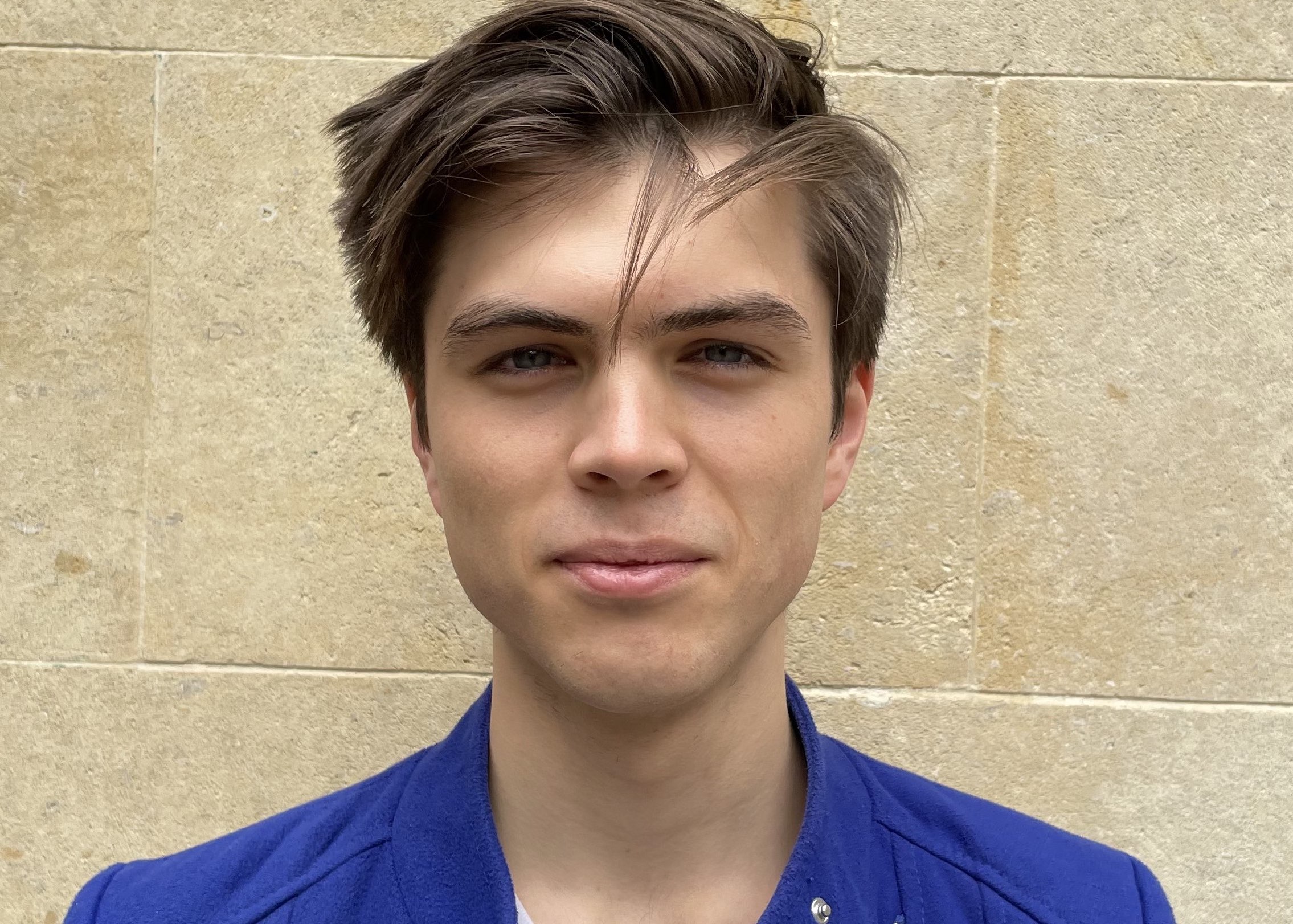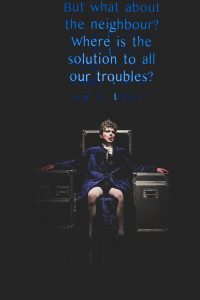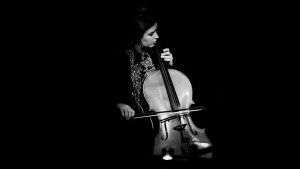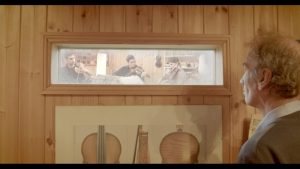
Artist of the Week: Kilian Meissner
by Flora Bigham | June 7, 2023
Tell me about yourself:
Hi, I’m Kilian. I’m a third-year classicist at New, and I have a conducting problem. Aside from music, I also play the viola.
How did you first get into conducting?
The story I like to tell is that I was very lucky to be playing in the National Children’s Orchestra when one day the conductor (Natalia Luis-Bassa) asked the orchestra if anyone wanted to try conducting – I did (it was the 20th Century Fox theme tune). Then she said, “Okay, you conduct in the concert,” and so I started my conducting career on stage at the Barbican and have been wanting to make my way back there ever since.
The actual story is that the lovely two musicians in charge of my local community orchestra (Mark Tinkler and Michael Copley) encouraged me to try it out and learn.
What is it about the role of conductor that you are so drawn towards?
The attention.
What’s the Oxford scene like for a conductor?
Cut-throat, blood everywhere, just brutal. Brawls break out after auditions, the amount of baton wounds I have sustained is unsustainable. Otherwise, it’s really quite lovely – the other conductors are absolute delights (keep your eyes peeled for Alice Knight with OUPhil, Andre Chan with OUSE, Maria Copley with OUWO, and many others I’ve had the pleasure to work with), which is massively important as we all play for each other. They’re really very supportive.
The sheer amount of music going on means that Oxford has a demand for lots of conductors all the time – I once calculated that there were more than 30 large ensemble concerts a term – so it’s pretty relaxed in terms of competition as well. The unfortunate thing about conducting in Oxford, however, is that the sheer amount of academic work stops you from being able to prepare as much as you’d like. Luckily, I’m very willing to sacrifice my degree.
What have you been working on recently?
My mind at the moment is totally occupied by our anniversary concert of the Lumière Ensemble Oxford, happening on Wednesday 14th June in New College Chapel (look us up on Facebook or Instagram!). We’re playing what I think has become my favourite piece of all time, Schönberg’s Pelleas and Melisande.
Other than LEO, this is what I’ve been doing the past four weeks: in 5th week I had the Oxford University Orchestra concert – we’re conducted by professionals, so that wasn’t me, but I am Manager and so had a wonderful time organising; as a conductor in 6th week, I was plunged into daily rehearsals with OU Sinfonietta, where we played an exciting programme of Shostakovich and Kurt Weill for a concert at the end; and I’ve just finished a run of The Sorcerer with the Gilbert and Sullivan society which has given me a newfound respect for anyone who conducts opera. I feel a lot older.
What has been a favourite memory of conducting or playing in Oxford?
Very hard to pick. Conducting probably anything with the Lumière Ensemble Oxford, who are just the most incredible musicians and instrumentalists. I am biased because I set it up with Izzie Thorneycroft and Carlotta Rothenfusser, and so it’s been very close to my heart.
My highlight was a concert of Debussy’s Prélude à l’après-midi d’un faune, and Milhaud’s La création du monde in Michaelmas where we finished it all off by accompanying a film to Pierné’s Giration. The energy was just thrilling. Playing-wise, it sounds silly but Merton Winter Ball, where my quartet accompanied the ballroom dancing with arrangements of All Of Me and Feel It Still. The handsome fee and free drinks probably helped though…
Tell us a bit about your creative process in the role: how do you go about score study and how much creative licence away from the score do you allow yourself?
Well, I tell everyone that I don’t listen to recordings before reading a score for the first time. I do try, I promise, but inevitably I run out of time and try to learn by osmosis, holding my phone up to my ear as I cycle to my audition; but if I’m doing it properly, I try to hear the score in my head, mark in phrase lengths, jot down the harmony and highlight a couple of important cues, and then it’s just about internalising.
The second part of the question about creative licence comes down to the age-old question: “What is music?”. There was a phase in the twentieth century where music was the score and nothing else, but now there has been a massive shift by musicologists towards reconceptualising music as performance. This difference was embodied earlier by Toscanini and Furtwängler, two massive conductors of the early-mid twentieth century. Toscanini worked with lots of German orchestras and didn’t know much German, but one of the few phrases he did know was ‘Hier steht…’, which translates to ‘it says here…’, followed by a remark about the score – you can see what his priorities were. When Furtwängler went to see his rendition of Beethoven’s 9th symphony, he walked out after the first movement and called him a “bloody metronome”. How dare the sextuplets at the opening of the piece actually be sextuplets! I think, for modern-day conductors, including me, it’s much more of a halfway house. You should be able to justify an interpretative decision with reference to the music, but the score is not the word of the Lord.
Your favourite piece to conduct?
Schönberg’s Pelleas und Melisande, without a doubt. Although anything with a fast time signature changes makes me look good so…
No, in all seriousness, the emotional complexity and structural complexity is an ever-giving source of excitement for me, and I’m starting to see why Liszt thought that the tone-poem was the ultimate musical form.
How do you feel about the accessibility of your lifestyle, being a classicist who conducts?
I don’t want to speak to anyone else’s experience, and I’d encourage you to talk to other musicians about this, but accessibility is a very big problem. I think it manifests itself slightly differently: in Classics, the private/state school divide is considerable, and in music, because a lot of tuition occurs outside of the school environment, there’s an access problem in that sense. With this said, the schooling situation is still a huge problem because a lot of people get into music through school.
I was very lucky that my school in Bonn at the time had an orchestra and was encouraging children to pick up the viola, but yes, investment into music education, which is sorely lacking in the UK, is crucial for the survival of the arts.
The other problem is how the music industry works, and it’s especially pronounced in conducting. It’s disproportionately connections-based, and so if you’re lucky enough to have had the opportunity of being born into a family of musicians or, as I have, being part of NYO or a Junior Conservatoire when growing up, that gives you an advantage in that you have made contacts that will help you into the industry. I don’t want to sound all doom and gloom, but as long as the government treats an education in the arts as second-class, the challenge is considerable.
In Oxford, you’re in a very privileged position because you have access to orchestras, but there is a mystique around conducting that discourages people from learning it. It is really an instrument just like any other, and I think teachers like Sian Edwards are doing a great job at making it more scientific. Because of this perception, we also have to recognise the long-term marginalisation of female conductors and conductors of colour, which is exacerbated by a system that’s not insignificantly affected by nepotism, and so I would really encourage you to talk to them about their experiences – I know Alice Knight will have much more interesting things to say.
Any conducting heroes?
Felix Kirkby.
Where do you see yourself in the next 10 years?
Definitely on the podium. Thierry Henry was once asked what he would have been if he didn’t become a professional footballer, and he responded “an amateur footballer”, and that is exactly how I feel. Obviously about conducting though, not football.
Interview by Flora Bigham.
Photography by Isaaq Tomkins.




